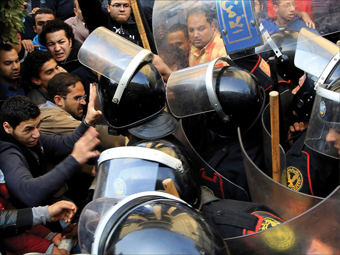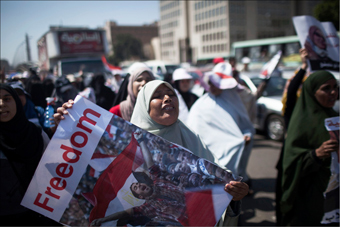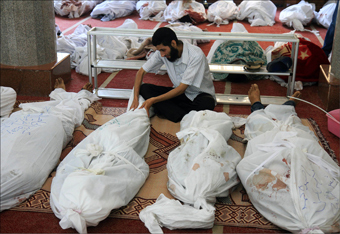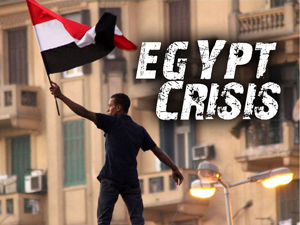
(FinalCall.com) – In Cairo on August 14, the worst was realized as Egypt’s security forces, backed by bulldozers, and using tear gas and live ammunition, moved in on two huge pro-Mohamed Morsi protest camps, launching into a long-threatened forced removal. Hundreds, maybe thousands, of the mostly peaceful demonstrators dead and thousands more wounded. The shooting and unrest continued for days capturing world attention.
By Friday, Aug. 16, at least 700 deaths had been reported despite a curfew and there were calls for the U.S. to end all military aid to Egypt. The Egyptian military ouster of democratically-elected Morsi had brought a tepid response from the U.S.
Before the violent explosions, the U.S. was undecided on whether the military forcing the Muslim Brotherhood leader from office and detaining him was a coup. The camps were filled with Egyptians protesting the removal of the president and the military’s return to power.

The “massacre” carried out by security forces succeeded in gaining control of protest camps at the Rabaah al-Adawiya Mosque and a smaller encampment in nearby Giza, not far from Cairo University. By the end of the first day security forces had turned the capital into “a war zone,” journalists said. A state of emergency was declared and a curfew imposed on major cities including Cairo, Alexandria and Suez. The curfew has been imposed for a month–or until further notice.
Women and children were among casualties, prompting military government officials to suggest the Muslim Brotherhood movement deliberately used the innocents as “human shields.” News reports suggested otherwise. Families interviewed before security forces moved in said they came of their own accord, and if they or their children were “martyred” it was the will of Allah (God).

During a phone interview with The Final Call Afnaan Moharram, an Egyptian American student at the University of Pennsylvania, expressed outrage at the “violence used against protesters that are predominately unarmed.”
Moharram, who goes back to Egypt for periodic visits, said, “The people in the two squares … were very aware of the threat that they were facing and they were standing very firmly for justice, declaring, ‘If we die, we die for freedom.’ ”
Moharram, who was born in the U.S. and is in daily touch with family members in Egypt said “people have been brainwashed into believing that everyone in the two squares protesting are either terrorists or are all members of the Muslim Brotherhood, or Islamist parties.” But the composition of the protest was “very, very diverse,” she said. “Just as it was during the January 25th Revolution, there have been videos produced by various organizations showcasing the diversity in the square.”
Ali Tobah, who took part in the recent demonstrations has been involved in the Egyptian revolution since January 2011. Tobah, who has a graduate degree in computer engineering and manages his family’s trade and construction business in Cairo, e-mailed from Egypt that the best description of the protesters is that they are “anti-coup.”
“The Muslim Brotherhood is at the core of the protests, but they are … no longer the majority. There are lots of videos and statements by non-members and even non-Muslims who are not affiliated with any group or political party,” he told The Final Call.
One of the reasons Egyptians about-faced on their opposition to President Morsi was “they realized it was a coup and saw the army’s heavy-handed approach,” Tobah explained.
Moharram said many Egyptians feel that the best way to have dealt with disagreements with President Morsi was the ballot box. The military voided the political process and is perpetrating a grave injustice against Egyptian citizens, she said.

A major player in the crisis is Egyptian General Abdel Fattah al-Sissi. During a recent two-hour interview with the Washington Post, the single person most responsible for the overthrow of Egypt’s first democratically elected president, and who many now believe is responsible for the massacre, wondered aloud why President Obama hadn’t called him. Sissi appeared concerned with “his sense of self-importance,” according to a leading unidentified strategy analyst.
“Clearly,” said Egyptian Major General Abdul Hamid Imran in the Middle East Monitor, “al-Sissi regards himself as the real ruler of Egypt and not just Minister of Defense, which is why he is upset that President Obama did not call him after the coup.”
According to Imran, as reported in the Middle East Monitor, “The Americans see things in a balanced manner; they know that al-Sissi is Egypt’s Defense Minister, so why would Obama call him?”
Maybe this reputed overblown sense of self has something to do with why the New Republic called al-Sissi “insecure” and “a thuggish autocrat.”
The commentary that appeared in the New Republic included a response from Senator John McCain. For years–likely because of his role as a ranking member of the Senate Committee on Armed Services–the Republican politician has had a relationship with the Egyptian military. In his “candid” response, the Arizona senator said, “As soon as I met him (Sissi), I said, This guy is not his predecessor. And everyone said, Oh no. He’s (Mohamed) Morsi’s guy, and I said, Not this guy, he’s his own guy.”
President Obama announced Aug. 15 that the U.S. was canceling scheduled military maneuvers with Egypt because of the crisis in the country. While he called for respect for democracy and rule of law, days earlier the administration was still reluctant to call Morsi’s overthrow a coup.
America’s steady supply of weapons to Egypt also received a little more scrutiny with analysts and media saying U.S.-made military hardware sent to Egypt “may have more to do with American industry than geopolitical demand.”
NPR reported, “Short of an alien invasion, there’s no conceivable scenario” under which Egypt would need the thousands of tanks and hundreds of fighter jets–many still under wraps–sent to Egypt since the late 1980s.
“The U.S., with typical short-sightedness, showed a willingness to sacrifice democracy for stability in Egypt. And in return we got undemocratic thugs who don’t even like us,” argued the New Republic.
Outside the Al-Iman mosque, according to USA Today, near an encampment, “robust chants against the military and police erupted” following mid-afternoon prayers Aug. 15. “We will not stop at this death,” vowed Motaz Islmail, 41, a manager at a chemical trading company, the newspaper reported. “It just increases encouragement to continue the way of the revolution, democracy until we get our country back.”

In a televised statement the previous day, Egypt’s Interim Prime Minister Hazem el-Beblawi said the difficult decision to stop the protests came after mediation failed. “We found that matters had reached a point that no self-respecting state could accept,” he said. The interim prime minister blamed the military crackdown on “the spread of anarchy and attacks on hospitals and police stations.”
On Friday Aug. 16 the Muslim Brotherhood called for a nationwide “Millions March of Anger.” Violence and deaths followed. That same morning on NPR’s Morning Edition, Mona Al-Kazaz, a London spokesperson for the Muslim Brotherhood said, “Our greatest weapon is our moral and pragmatic decisions to stand in a peaceful way.” The only available option is to “take to the streets” to save “our ballots from the bullets,” she said.
Al-Kazaz, who said she lost 10 members of her family during the military crackdown, stressed it’s not about the Brotherhood. It is about “rescuing the democratic process,” she said.
Moharram said the problem is a military-run government. “You cannot have a democracy that is run by the military. It’s an oxymoron,” she said. Many Egyptians are “anti-the-coup because they support the legitimacy of the president” and what that office stands for in terms of a democratic Egypt, the university student explained.
“Look at America, she said, “if we had every Republican who hated President Obama to go out in the street and say we want Obama to leave (office) in his second term, that is not democracy.”
Responding to a question about next steps, Tobah responded, “As far as I know, protests are continuing. If negotiations don’t make any progress, and the coup government continues to crack down, it may turn more violent.” The Muslim Brotherhood had expressed a determination to stop the military government through peaceful means–but military violence has continued to grow.
Jehron Muhammad, who writes from Philadelphia, can be reached at [email protected].












